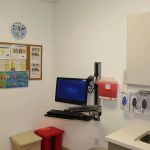Why Regular Dental Cleanings are Essential for Your Oral Health
As someone who has experienced the benefits of regular dental cleanings firsthand, I can confidently say that these routine visits are crucial for maintaining not just a bright smile, but also long-term oral health. I used to skip my cleanings, thinking that brushing and flossing at home were enough to keep my teeth in top shape. However, after a few visits to the dentist, I quickly realized just how vital professional cleanings are in preventing serious dental issues.
1. What Happens During a Dental Cleaning?
Before diving into why regular dental cleanings are so important, let me first walk you through what happens during a typical cleaning. The process is quite simple but incredibly effective in maintaining your oral health. A dental hygienist will first examine your mouth to check for signs of cavities, gum disease, or any other issues that might need attention. Then, using special tools, they’ll remove plaque and tartar from your teeth and along the gum line. Tartar, which is hardened plaque, can’t be removed with regular brushing, which is why professional cleanings are necessary.
After the cleaning, the hygienist will polish your teeth with a special paste to remove surface stains and leave your mouth feeling fresh. In some cases, the dentist may also perform additional treatments, such as fluoride applications, to further protect your teeth from decay. It's a simple process that takes about 30 to 60 minutes, but the benefits far outweigh the time investment.
2. Preventing Tooth Decay and Gum Disease
One of the primary reasons I now make regular dental cleanings a priority is because they help prevent tooth decay and gum disease, two of the most common dental problems. Plaque is a sticky film of bacteria that forms on your teeth, and if it’s not removed regularly, it can lead to cavities. Over time, plaque can harden into tartar, which contributes to gum disease, a condition that can lead to bleeding gums, tooth loss, and more serious health issues like heart disease.
By having my teeth professionally cleaned every six months, I’ve drastically reduced the risk of cavities and gum disease. Dental hygienists use specialized tools to clean areas that are hard to reach with a toothbrush and floss, ensuring a thorough clean that I just can't achieve at home. Regular cleanings are key to catching early signs of decay and gum disease before they become serious problems.
3. The Connection Between Oral Health and Overall Health
In addition to preventing dental problems, I’ve learned that maintaining good oral hygiene through regular cleanings has a broader impact on my overall health. Research has shown that gum disease is linked to several systemic health issues, including diabetes, heart disease, and stroke. The bacteria from infected gums can enter the bloodstream and affect other parts of the body, which is why it’s so important to keep your gums healthy.
For instance, I recall a family member who neglected their oral health for years, and it eventually led to gum disease. They were shocked when their doctor informed them that their gum health was affecting their blood pressure and overall cardiovascular health. This was a wake-up call, and they quickly committed to regular cleanings and better at-home oral care. Now, they’re healthier and more aware of the crucial connection between oral and overall health.
4. Fresh Breath and a Bright Smile
Another benefit I’ve personally enjoyed from regular dental cleanings is fresh breath and a brighter smile. Plaque buildup can cause bad breath, as bacteria that thrive on your teeth can produce unpleasant odors. The polishing step in a professional cleaning helps remove surface stains from food, coffee, or smoking, leaving your teeth brighter and your breath fresher.
It's amazing how much more confident I feel when I know that my teeth are clean and healthy. I can smile without hesitation, and I no longer have to worry about the embarrassment of bad breath. Regular dental cleanings not only improve your health but also contribute to your overall confidence and self-esteem.
5. How Often Should You Get a Dental Cleaning?
For years, I thought that dental cleanings were a luxury or something that could be done only when problems arose. However, after learning more about oral health, I realized that regular cleanings are a preventive measure that can save you a lot of time, money, and pain in the long run. Most dental professionals recommend getting a cleaning every six months, but some individuals with specific health conditions may need more frequent visits.
For example, if you’re prone to gum disease or have a history of cavities, your dentist may recommend cleanings every three to four months. On the other hand, if you have excellent oral hygiene and no risk factors, your dentist may suggest an annual cleaning. It’s essential to follow your dentist's advice and maintain a regular schedule to ensure the best possible outcomes for your oral health.
6. Overcoming Dental Anxiety
I completely understand if the thought of going to the dentist makes you anxious or uneasy. I used to dread dental visits myself. However, I’ve found that with each cleaning, the fear decreases. It’s also helpful to know that dental professionals are trained to make the experience as comfortable as possible. They use gentle techniques, and some offices even offer sedation options for those with severe dental anxiety.
When I started focusing on the long-term benefits, such as preventing tooth loss and avoiding painful procedures down the road, my anxiety started to lessen. I began to look forward to my cleanings as a way to keep my mouth in top shape, and today, I no longer hesitate to schedule my appointments.
Regular dental cleanings are an essential part of maintaining oral health, and I can personally attest to the positive impact they’ve had on my well-being. Whether you’re looking to prevent cavities, improve your breath, or protect your overall health, professional cleanings are an investment worth making. Don’t wait for dental issues to arise – start prioritizing your dental health today for a healthier, happier future.







 PM Dental Care PLLC4.0 (217 review)
PM Dental Care PLLC4.0 (217 review) California Dental Group4.0 (235 review)
California Dental Group4.0 (235 review) OKC Endo - David C Bird DDS5.0 (34 review)
OKC Endo - David C Bird DDS5.0 (34 review) Pro Dentists of Buford4.0 (575 review)
Pro Dentists of Buford4.0 (575 review) Jeffrey S. Sachs,D.M.D.4.0 (27 review)
Jeffrey S. Sachs,D.M.D.4.0 (27 review) ChapCare by AltaMed Medical and Dental Group — Pasadena, Fair Oaks3.0 (47 review)
ChapCare by AltaMed Medical and Dental Group — Pasadena, Fair Oaks3.0 (47 review) The Importance of Oral Health Education During Pregnancy for a Healthy Pregnancy
The Importance of Oral Health Education During Pregnancy for a Healthy Pregnancy Best Tips for Brushing Your Teeth Properly for Healthy Gums: Essential Techniques for Oral Health
Best Tips for Brushing Your Teeth Properly for Healthy Gums: Essential Techniques for Oral Health Why Skipping Dental Checkups Can Lead to Bigger Oral Health Problems
Why Skipping Dental Checkups Can Lead to Bigger Oral Health Problems Advantages of Porcelain Dental Restorations
Advantages of Porcelain Dental Restorations How Can Diabetes Cause Tooth and Gum Problems? Preventing and Managing Oral Health Issues
How Can Diabetes Cause Tooth and Gum Problems? Preventing and Managing Oral Health Issues Healthy Habits for Promoting Good Oral Health and Hygiene: Tips for a Healthy Smile
Healthy Habits for Promoting Good Oral Health and Hygiene: Tips for a Healthy Smile